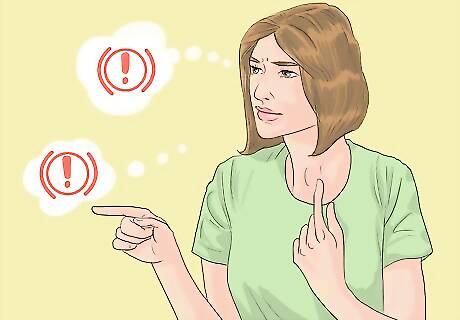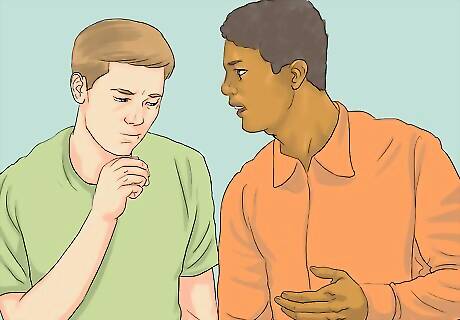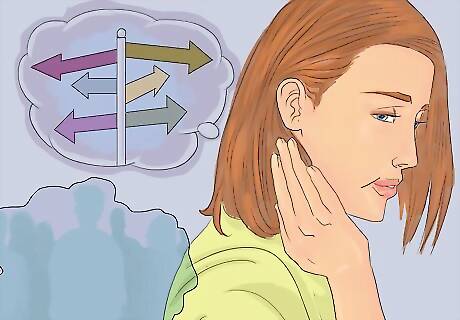
views
Considering and Evaluating

Take a step back to rationally think through the situation. The purpose of this is to ensure you are making the best choice possible to avoid negative consequences. Think about how you got in to your current position. A possible decision on what to do next could arise from how you got yourself there. Ask yourself how a crisis could be avoided. Would doing the right thing be so hard a process if only you did things a bit differently before? Whom else is this affecting? If it is multiple individuals, how will you rising up as the one doing the right thing affect your relations? Compare the current predicament to past experiences where you had to figure out how to do the right thing. Look at what worked or what didn't, and apply what you learned to the present.

Imagine possible outcomes. that could happen because of you making a particular decision. Evaluate all, or potentially important outcomes, so you don't decide on an impulse. Make sure you aren't in an environment that pressures you in to making decisions. Especially if you are trying to do the right thing in a professional setting, be conscious of the long-term effects of your actions. Weigh the pros and cons of each outcome. Ask yourself how one result could possibly work better than another. Prepare yourself for any unexpected reactions from others. It may be difficult to expect the unexpected, but getting in the mindset of that possibility can reduce panic and further stress.

Consider any other individuals involved. Doing the right thing isn't just about you. Most of the time it involves others, and correcting a wrong holds the possibility of crossing others. On the other hand, other people may help you solve any conflicts and aid you in deciding what to do. Try asking yourself these questions to see how it may affect your decision making: How will “doing the right thing” be for the benefit of others? How will the situations get better when I do it? How will your relationships improve? Worsen? What makes what you're doing “the right thing”?
Staying Calm

Try not to overthink or over analyze the situation, your reaction and possible outcomes. Doing so could result in several things that can affect how you go about doing the right thing: You start self-doubting yourself. When you arrive at a decision on the right course of action to make things right, you want to make it confidently. It's not the end of the world. Doing this one right thing doesn't mean that you are incapable of making the correct decision in the first place. Take the mistake in stride, and learn from what you did wrong. Nothing would happen. If you are too panicky, you'll scare yourself into acting on time. If you are really unsure, talk it over with others – the subjective view from others can be a refreshing viewpoint on the situation.

Keep your emotions in check. An emotion can quickly become too much to handle. If you're dwelling on how to do something right to fix a problem, ensure you make time to step away from the situation. Take a breather, and don't try to solve everything in a self-set time frame. Pay attention to any physical bodily reactions. Sometimes, our bodies can physically show signs of stress. Keep checking in with yourself if things are getting too much to handle. Don't try to control or hold back emotions. It's important to let anything and everything in to feel it all. Our emotions are natural, they make us who we are and they play vital roles in what we believe is the right thing to do. Pay attention to what you are feeling and focus on what to do with them. Refrain from acting on impulse. Our initial reactions to situation may not always be the best one. Think carefully if you want to react, as impulses may not always be the best way to go about doing right things.

Talk to someone. This can relieve any pressure you have on yourself. It always helps to talk out problems and what you are struggling with. Make your voice heard. Address your problems so people know what you're struggling with. By verbally acknowledging that you are struggling with doing the right thing, you aren't so caught up in your own thoughts, running around in circles. Find someone who understands why you need to do the right thing. They will have an easier time understanding your struggle, thus more likely to give applicable advice. Have a fresh perspective on the situation. Perhaps you've been dwelling on how to solve a problem for too long. By having another person's input they may bring in to light other ideas that you may have missed. A therapist or life coach is a good person to talk to.

Evaluate how you handled the situation, what your thought processes were like, and if applicable, who you spoke to for advice. Doing the right thing in the moment of need is only half the work, as the other half lays in the personal growth you go through. Every situation is different, and the right thing that is needed varies. Look back and see how you can learn from all of them. When you think you've done the right thing, ask yourself some questions, such as: How can doing this particular right thing reduce doing the wrong thing in the future? Am I happy with the result(s)? How did I handle this differently from past situations?
Maintaining Reputations

Carry out what you do in a manner that appropriately represents you and others. Your representation, and the representation of others should be kept in mind. This is vital if the situation is in a professional (i.e. work) setting. Ask yourself some key questions to help you decide on what is the right thing to do and how to do it: Will this decision go against your morals? Who could you potentially cross? Also, how will you go about avoiding this? How will others think of you? Do the other involved parties think this is a big enough deal for a “right thing” to be done?

Touch base with others and act as soon as possible. Doing right by others is just as important as carrying out a right deed to avoid guilt. It doesn't have to be a formal “group debrief”, but speaking with other involved individuals afterwards can relieve some residue tension. Keep in mind that talking with others can also positively result in the following things: Engaging with others throughout the process of trying to do the right thing can keep everyone on the same page. Adequate communication avoids discrepancies between ideas and reactions. Try to diffuse tension among others. Depending on the severity of the situation, you may want to reconsider acting without considering other people's feelings. Ask why and how people are reacting to you in certain ways. Do they not agree that what you are doing is the right thing? Are they still mad? Asking why someone is acting in a certain way can put you in their shoes, and you can make better decisions with there perspective in mind.

Let everyone make his or her voice heard. We all have reputations to maintain. Whether it is for others to see, or for ourselves to be the person we are, or strive to be, it is important to keep in mind how we present ourselves and represent others. Ensure you are acting in a manner that won't be detrimental to others' reputations. This is especially important to keep in mind in professional settings like the work place. Do the right thing so it doesn't make others doubt your judgment. If others perceive you in a certain way, you want to keep in mind what others will say about you. Before carrying out the decision, try asking around if what you think of doing is truly the right thing to do. Don't ignore advice. You may feel like what you are doing is the right thing, but listen to what others have to say about it. They can help you tweak ideas and your delivery method.




















Comments
0 comment